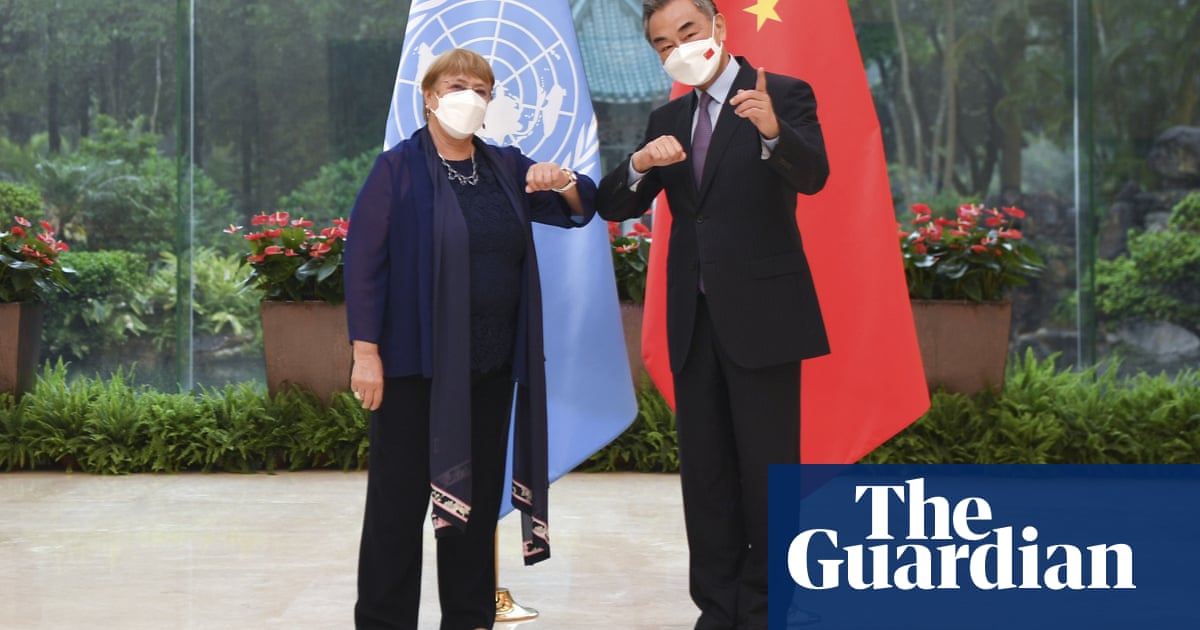
China’s leader, Xi Jinping, has spoken with the UN human rights chief, Michelle Bachelet, as she visited the Xinjiang region, warning against the politicisation of human rights as an “excuse to interfere in the internal affairs of other countries” and defending his government’s record.
It comes amid renewed defensiveness in Beijing after the publication of a significant data leak from Xinjiang’s security apparatus, including mugshots of thousands of detained Uyghurs and internal documents outlining shoot-to-kill policies for those who try to escape.
Xinjiang is home to millions of Uyghur and other Turkic Muslims, who have been subjected to a Chinese government campaign of cultural, linguistic and social control and acts of oppression that governments including the US have termed a genocide.
Bachelet, the UN’s high commissioner for human rights, is in China for a highly orchestrated six-day visit, including the Xinjiang cities of Kashgar and Urumqi. The tour, which China has said is not an investigation, has been met with criticism by some western legislators over its potential to be used as propaganda.
In a video call on Wednesday, Xi and Bachelet “expounded in depth major issues related to the development of the Chinese human rights cause”, according to an official state media readout. The president said China had successfully embarked on a human rights path that “suits its national conditions”.
“There is no perfect ‘ideal country’ on the human rights issue; there is no need for a ‘teacher’ who commands other countries, and we can’t politicise and instrumentalise the human rights issue, engage in double standards, and use human rights as an excuse to interfere in the internal affairs of other countries,” he told her, according to CCTV and Xinhua.
“Deviating from reality and completely copying the institutional model of other countries will not only be difficult to adjust to, but also bring disastrous consequences, and in the end, it is the broad masses of the people who will suffer.”
The readout also claimed that Bachelet, among other remarks, told Xi she “admired China’s efforts and achievements in eradicating poverty, protecting human rights, and realising economic and social development”.
The Guardian contacted the office of the high commissioner, which gave a different version of her comments, delivered in front of some reporters. Foreign media has been banned from accompanying the tour.
“I have been committed to undertaking this visit – the first visit by a UN human rights high commissioner to China in 17 years – because for me, it is a priority to engage with the government of China directly, on human rights issues, domestic, regional and global,” Bachelet told Xi, according to the UN transcript.
“For development, peace and security to be sustainable – locally and across borders – human rights have to be at their core. China has a crucial rule to play within multilateral institutions in confronting many of the challenges currently facing the world, including threats to international peace and security, instability in the global economic system, inequality, climate change and more. I look forward to deepening our discussions on these and other issues, and hope my office can accompany efforts to strengthen the promotion and protection of human rights, justice and the rule of law for all without exception.”
The transcript covered Bachelet’s comments at the beginning of the meeting but not the whole conversation with Xi.
Chinese state media readout of what Bachelet told Xi vs OHCHR transcript of what Bachelet told Xi pic.twitter.com/87CAQHuSM7 — Helen Davidson (@heldavidson) May 25, 2022
Foreign officials have raised questions over what Bachelet’s visit can realistically achieve, and there is concern that the Chinese government will use the trip to whitewash its human rights record. So far the visit has included Bachelet receiving a gift of the book Xi Jinping on Respecting and Protecting Human Rights, and she has been photographed bumping elbows with China’s foreign minister, Wang Yi. The US has called the visit a mistake.
Xi’s comments to Bachelet on Wednesday underscored the deep sensitivity in China’s government to criticism of its human rights record. It has long denied claims and evidence of its abuses against Uyghurs, saying it is conducting anti-terrorism and poverty-eradication programmes in Xinjiang. At first, Beijing denied the existence of detention camps, before describing them as vocational training centres.
Documents called the Xinjiang Police Files, released on Tuesday, were obtained by the researcher Adrian Zenz from unidentified hackers and published by a consortium of media outlets including the BBC. They revealed thousands of photos of detained Uyghurs, and a database of tens of thousands of records detailing the alleged crimes – including studying scripture or travelling to sensitive countries – that led to their detention or jailing. It also detailed policies on extreme use of restraints to transfer “trainees” between facilities, and on permission for officers to shoot and kill attempted escapees.
China’s state media and officials have reacted with fury to the release, repeating long-held claims that evidence of abuses in Xinjiang are “the lies of the century” and accusing “anti-China forces” of fabricating smears. Media outlets have expounded the success of Xinjiang’s economy and modern life in an apparent effort to counter the reports.
“It seems that the United States and the United Kingdom and other countries don’t care about the truth at all, but want to use the visit of the high commissioner for human rights to hype the so-called ‘Xinjiang issue’ and smear China,” the foreign ministry’s spokesperson, Wang Wenbin, said on Tuesday.







